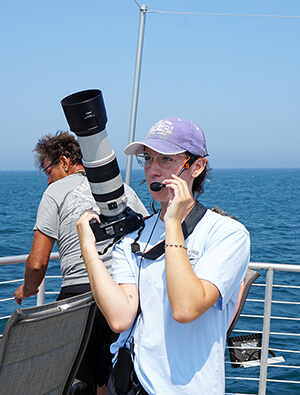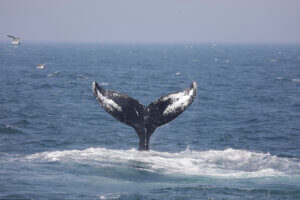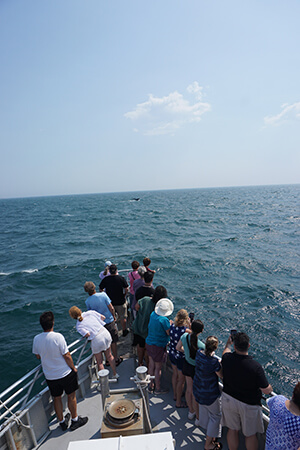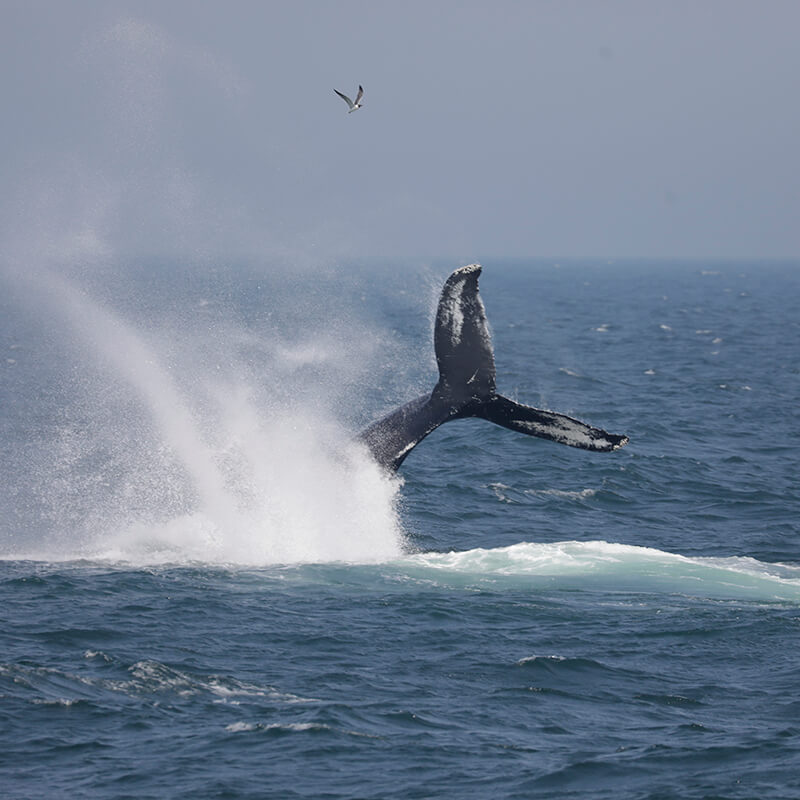
Brooke van de Sande knows the locations of the cetaceans. With a long-lens camera in one hand and a headset mic in the other, the naturalist on the Jersey Shore Whale Watch vessel Jersey Girl calls out “10 o’clock!” to alert passengers to a humpback whale lunging from the sea in the distance. Multitasking, she shares details about the behaviors and feeding habits of humpbacks over the PA, while trying to capture closeup photos of unique markings on the whale’s tail that can ID individual animals like a massive fingerprint.
The images and precise location will be shared with the nonprofit Gotham Whale, which is compiling a catalog of all of the whales spotted along the New York and northern New Jersey coasts. They’ve amassed data on hundreds of individual animals since they started in 2011.
But van de Sande is also determined to learn about the whales she can’t see. The senior marine and environmental biology and policy student at Monmouth University has been conducting research on how effective trace genetic materials floating in the water – called environmental DNA, or “eDNA” – can be for detecting humpbacks in the area.

While interning aboard the Belmar-based vessel in 2023, van de Sande collected a sample of ocean water every time there was a whale spotted within 100 feet. She then filtered out the organic materials from the bottles at a campus lab and tested them for humpback whale DNA. In every case, there was a match.
“Now we know that there is a strong correlation between DNA samples taken in the water and the visual sightings,” van de Sande said. “If we take a sample and see that there were high numbers of humpback whale DNA, then we can assume that there was a whale in the area, even if we didn’t see one. It’s a really non-invasive technique to monitor whales in the area.”
She recently presented her work at the Southeast and Mid-Atlantic Marine Mammal Symposium at the Duke University Marine Lab in North Carolina, where she garnered the top prize for undergraduate speed talks. Her work has been guided by faculty mentors Endowed Professor Marine Science Jason Adolf and Environmental DNA/Marine Fisheries Senior Scientist Sam Chin, as well as Gotham Whale Director of Marine Mammal Research Danielle Brown. Her work and conference travel were supported with a grant from the Urban Coast Institute’s Heidi Lynn Sculthorpe Scholars program.

Her class studies on coastal zone management and policy issues have given her added perspective on the importance of the research. She said waters that the Jersey Girl tours are busy with human activities such as cargo ship traffic and recreational boating, and it all needs to co-exist safely with the whales.
“Ocean urbanization and ocean planning is a big thing right now, especially in New Jersey, with all of the whales that have been showing up here over the past few decades,” she said. “It’s really important that we’re learning about all of the speed restrictions and laws going into place to protect the whales and we’re planning for the future of the ocean in New Jersey and New York.”

